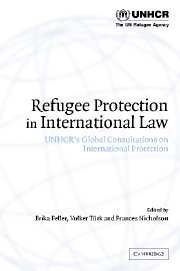Book contents
- Frontmatter
- Contents
- List of annexes
- Notes on contributors and editors
- Foreword
- Preface
- Acknowledgments
- Expert roundtables and topics under the ‘second track’ of the Global Consultations
- Table of cases
- Table of treaties and other international instruments
- List of abbreviations
- Part 1 Introduction
- Part 2 Non-refoulement (Article 33 of the 1951 Convention)
- 2.1 The scope and content of the principle of non-refoulement: Opinion
- 2.2 Summary Conclusions: the principle of non-refoulement, expert roundtable, Cambridge, July 2001
- 2.3 List of participants
- Part 3 Illegal entry (Article 31)
- Part 4 Membership of a particular social group (Article 1A(2))
- Part 5 Gender-related persecution (Article 1A(2))
- Part 6 Internal protection/relocation/flight alternative
- Part 7 Exclusion (Article 1F)
- Part 8 Cessation (Article 1C)
- Part 9 Family unity (Final Act, 1951 UN Conference)
- Part 10 Supervisory responsibility (Article 35)
- Index
2.2 - Summary Conclusions: the principle of non-refoulement, expert roundtable, Cambridge, July 2001
Published online by Cambridge University Press: 28 August 2009
- Frontmatter
- Contents
- List of annexes
- Notes on contributors and editors
- Foreword
- Preface
- Acknowledgments
- Expert roundtables and topics under the ‘second track’ of the Global Consultations
- Table of cases
- Table of treaties and other international instruments
- List of abbreviations
- Part 1 Introduction
- Part 2 Non-refoulement (Article 33 of the 1951 Convention)
- 2.1 The scope and content of the principle of non-refoulement: Opinion
- 2.2 Summary Conclusions: the principle of non-refoulement, expert roundtable, Cambridge, July 2001
- 2.3 List of participants
- Part 3 Illegal entry (Article 31)
- Part 4 Membership of a particular social group (Article 1A(2))
- Part 5 Gender-related persecution (Article 1A(2))
- Part 6 Internal protection/relocation/flight alternative
- Part 7 Exclusion (Article 1F)
- Part 8 Cessation (Article 1C)
- Part 9 Family unity (Final Act, 1951 UN Conference)
- Part 10 Supervisory responsibility (Article 35)
- Index
Summary
The first day of the Cambridge expert roundtable addressed the question of the scope and content of the principle of non-refoulement. The discussion was based on a joint legal opinion by Sir Elihu Lauterpacht and Daniel Bethlehem of the Lauterpacht Research Centre for International Law, which was largely endorsed.
The discussion focused on those aspects of the legal opinion which were considered deserving of particular comment or in need of clarification. The paragraphs below, while not representing the individual views of each participant, reflect broadly the consensus emerging from the discussion. The general appreciation of the meeting was:
Non-refoulement is a principle of customary international law.
Refugee law is a dynamic body of law, informed by the broad object and purpose of the 1951 Refugee Convention and its 1967 Protocol, as well as by developments in related areas of international law, such as human rights law and international humanitarian law.
Article 33 applies to refugees irrespective of their formal recognition and to asylum seekers. In the case of asylum seekers, this applies up to the point that their status is finally determined in a fair procedure.
The principle of non-refoulement embodied in Article 33 encompasses any measure attributable to the State which could have the effect of returning an asylum seeker or refugee to the frontiers of territories where his or her life or freedom would be threatened, or where he or she is at risk of persecution, including interception, rejection at the frontier, or indirect refoulement.
[…]
- Type
- Chapter
- Information
- Refugee Protection in International LawUNHCR's Global Consultations on International Protection, pp. 178 - 179Publisher: Cambridge University PressPrint publication year: 2003
- 1
- Cited by



